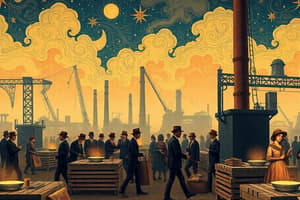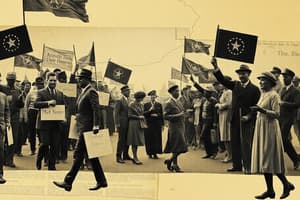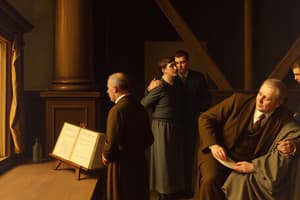Podcast
Questions and Answers
The Great Railroad Strike of ____ increased awareness of poor working conditions.
The Great Railroad Strike of ____ increased awareness of poor working conditions.
1877
The ___ Bridge was the longest suspension bridge in the world when completed in 1883.
The ___ Bridge was the longest suspension bridge in the world when completed in 1883.
Brooklyn
Each group of immigrants contributes to the ___ culture of America.
Each group of immigrants contributes to the ___ culture of America.
melting pot
President Chester Arthur helped pass the ____ Civil Service Act ending patronage.
President Chester Arthur helped pass the ____ Civil Service Act ending patronage.
___ values the individual as the highest authority.
___ values the individual as the highest authority.
______ fought a war with the United States in 1898.
______ fought a war with the United States in 1898.
The 1882 Chinese _____ Act prevented immigration from China.
The 1882 Chinese _____ Act prevented immigration from China.
_____ sought economic stability for African Americans in order to secure civil rights.
_____ sought economic stability for African Americans in order to secure civil rights.
____ served two nonconsecutive terms as President.
____ served two nonconsecutive terms as President.
_______ settled the Alabama Claims, concerning losses the United States sustained to a Confederate raider.
_______ settled the Alabama Claims, concerning losses the United States sustained to a Confederate raider.
The United States annexed ______ in the Pacific in 1898.
The United States annexed ______ in the Pacific in 1898.
____ is described as public school student mandatory attendance.
____ is described as public school student mandatory attendance.
Charles J. Guiteau assassinated President _____ just six months after he took office.
Charles J. Guiteau assassinated President _____ just six months after he took office.
____ made the United States the police of Latin America.
____ made the United States the police of Latin America.
What best describes the purpose of President Roosevelt's Great White Fleet tour?
What best describes the purpose of President Roosevelt's Great White Fleet tour?
What amendment guaranteed voting rights regardless of race?
What amendment guaranteed voting rights regardless of race?
The Interstate Commerce Commission regulates trade between the ______.
The Interstate Commerce Commission regulates trade between the ______.
The United States overcame technical and worker health issues to complete the _______ Canal.
The United States overcame technical and worker health issues to complete the _______ Canal.
______ was encouraged by the Sherman Silver Purchase Act.
______ was encouraged by the Sherman Silver Purchase Act.
The Great ___ Fire led to improved building codes and firefighting techniques.
The Great ___ Fire led to improved building codes and firefighting techniques.
_____ affirmed segregation as lawful until 1954.
_____ affirmed segregation as lawful until 1954.
Commodore _____ secured the Philippines for the United States at the Battle of Manila Bay.
Commodore _____ secured the Philippines for the United States at the Battle of Manila Bay.
The Sixteenth Amendment created a(n) national ___ tax.
The Sixteenth Amendment created a(n) national ___ tax.
Today a U.S. territory, ______, came under U.S. control as a result of the Spanish-American War.
Today a U.S. territory, ______, came under U.S. control as a result of the Spanish-American War.
___ was home to wealthy financiers and politicians who controlled New York politics.
___ was home to wealthy financiers and politicians who controlled New York politics.
The United States and ______ settled fishing, shipping, and border issues by signing the Treaty of Washington.
The United States and ______ settled fishing, shipping, and border issues by signing the Treaty of Washington.
The _____ was a time of great growth and prosperity.
The _____ was a time of great growth and prosperity.
_____ exposed mistreatment of the mentally ill by posing as a patient.
_____ exposed mistreatment of the mentally ill by posing as a patient.
______ led a decisive attack up San Juan Heights during the Spanish-American War.
______ led a decisive attack up San Juan Heights during the Spanish-American War.
What describes why the national income tax created by the Sixteenth Amendment is related to the Progressive movement?
What describes why the national income tax created by the Sixteenth Amendment is related to the Progressive movement?
Black historians refer to the Compromise of 1877 as the ____.
Black historians refer to the Compromise of 1877 as the ____.
The Sherman Antitrust Act broke up harmful ___.
The Sherman Antitrust Act broke up harmful ___.
The ____ Law of 1882 allowed custom officials to turn away people deemed 'undesirable' who were attempting to move to America.
The ____ Law of 1882 allowed custom officials to turn away people deemed 'undesirable' who were attempting to move to America.
Public school advocate _____ introduced classrooms divided by age.
Public school advocate _____ introduced classrooms divided by age.
Author ______'s book, The Jungle, exposed unsanitary practices in the meatpacking industry.
Author ______'s book, The Jungle, exposed unsanitary practices in the meatpacking industry.
Flashcards are hidden until you start studying
Study Notes
Key Events and Legislation
- The Great Railroad Strike of 1877 highlighted poor working conditions and increased labor awareness.
- The Pendleton Civil Service Act, supported by President Chester Arthur, ended the practice of patronage in government jobs.
- The Sherman Antitrust Act aimed to dismantle monopolies that were harmful to competition.
Immigration and Cultural Contributions
- The 1882 Chinese Exclusion Act prevented Chinese immigration, reflecting the era's restrictive immigration policies.
- Immigrants contributed to America's melting pot culture, enriching diversity across the nation.
Significant Figures
- Booker T. Washington advocated for economic stability and civil rights for African Americans.
- Upton Sinclair's novel "The Jungle" revealed unsanitary conditions in the meatpacking industry, prompting reforms.
- Elizabeth Cochran, also known as Nellie Bly, exposed mistreatment of the mentally ill by feigning insanity to enter a mental institution.
U.S. Territorial Expansion
- The United States annexed Hawaii in 1898, expanding its influence in the Pacific.
- Puerto Rico became a U.S. territory following the Spanish-American War, altering its political landscape.
Historical Court Cases
- Plessy v. Ferguson affirmed the legality of segregation until overturned in 1954 by Brown v. Board of Education.
Amendments and Social Issues
- The Fifteenth Amendment guaranteed voting rights regardless of race, aiming to protect African American electoral rights.
- The Sixteenth Amendment instituted a national income tax to fund various Progressive programs.
Economic and Infrastructure Developments
- The Interstate Commerce Commission was established to regulate trade between states, impacting commerce.
- Completed in the early 1900s, the Panama Canal addressed technical and worker health issues, enhancing maritime trade.
- The Chicago Fire of 1871 resulted in improved building codes and firefighting techniques, influencing urban development.
Warfare and Military Leadership
- The Spanish-American War in 1898 saw Commodore George Dewey secure the Philippines for the U.S. during the Battle of Manila Bay.
- Theodore Roosevelt led a key attack at San Juan Heights, becoming a notable military figure.
Social Movements
- The Gilded Age was marked by significant economic growth and societal change, outpacing earlier eras.
- Tammany Hall was synonymous with political corruption in New York, controlled by affluent financiers and politicians.
Legacy of Compromise
- The Compromise of 1877, referred to by Black historians as the Great Betrayal, marked a critical turning point in race relations and governmental policy following Reconstruction.
Philosophical Ideologies
- Anarchism prioritized individual authority over structured governance, challenging traditional political systems.
Other Key Developments
- Compulsory education laws mandated school attendance for children, transforming educational access.
- Bimetallism, encouraged by the Sherman Silver Purchase Act, aimed to fix the monetary system to both gold and silver.
International Relations
- The Roosevelt Corollary to the Monroe Doctrine established the U.S. as the police power in Latin America, reflecting imperialistic policies.
- The Treaty of Washington with Canada resolved fishing, shipping, and border disputes, fostering bilateral relations.
Studying That Suits You
Use AI to generate personalized quizzes and flashcards to suit your learning preferences.




